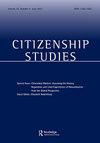不稳定的法律地位轨迹作为方法,以及法律地位工作
IF 1.9
3区 社会学
Q3 POLITICAL SCIENCE
引用次数: 3
摘要
对“幻想公民身份”的批评包括呼吁公民移民、剥夺公民身份和移民研究。作为回应,本文提出了“不稳定法律地位轨迹(PLST)作为方法”,重点关注法律地位工作。这种方法捕捉了社会法律地位轨迹的变化,包括非法化,并建立了一种“更厚”的轨迹方法。身份工作是指致力于在一个管辖区内工作和/或获得服务和保护的努力、时间、金钱和其他资源。该方法还考虑了不会产生变化且不被计算在内的工作,以及与其他参与者的互动。这有助于理解不稳定的法律地位轨迹是如何形成的,并导致公民身份的不平等和差异包容的动态。在不稳定的非公民比例持续上升的背景下,以及在方法论民族主义阻碍PLST的情况下,它移民了公民。本文章由计算机程序翻译,如有差异,请以英文原文为准。
Precarious legal status trajectories as method, and the work of legal status
ABSTRACT Critiques of ‘fantasy citizenship’ include calls to migrantize the citizen and denationalize citizenship and migration studies. In response, this essay proposes ‘precarious legal status trajectories (PLSTs) as method’, with a focus on the work of legal status. This approach captures changes in sociolegal status trajectories, including illegalization, and builds a ‘thicker’ approach to trajectories. The work of status refers to effort, time, money, and other resources devoted to being present in a jurisdiction, and/or gain access to services and protections. The approach also considers work that does not produce changes and is not counted, and interactions with other actors. This contributes to understanding how precarious legal status trajectories are assembled and contribute to inequalities in citizenship and dynamics of differential inclusion. It migrantizes the citizen in a context where the share of citizens who were precarious noncitizens continues to rise, and when methodological nationalism occludes PLSTs.
求助全文
通过发布文献求助,成功后即可免费获取论文全文。
去求助
来源期刊

Citizenship Studies
POLITICAL SCIENCE-
CiteScore
3.60
自引率
11.10%
发文量
85
期刊介绍:
Citizenship Studies publishes internationally recognised scholarly work on contemporary issues in citizenship, human rights and democratic processes from an interdisciplinary perspective covering the fields of politics, sociology, history and cultural studies. It seeks to lead an international debate on the academic analysis of citizenship, and also aims to cross the division between internal and academic and external public debate. The journal focuses on debates that move beyond conventional notions of citizenship, and treats citizenship as a strategic concept that is central in the analysis of identity, participation, empowerment, human rights and the public interest.
 求助内容:
求助内容: 应助结果提醒方式:
应助结果提醒方式:


